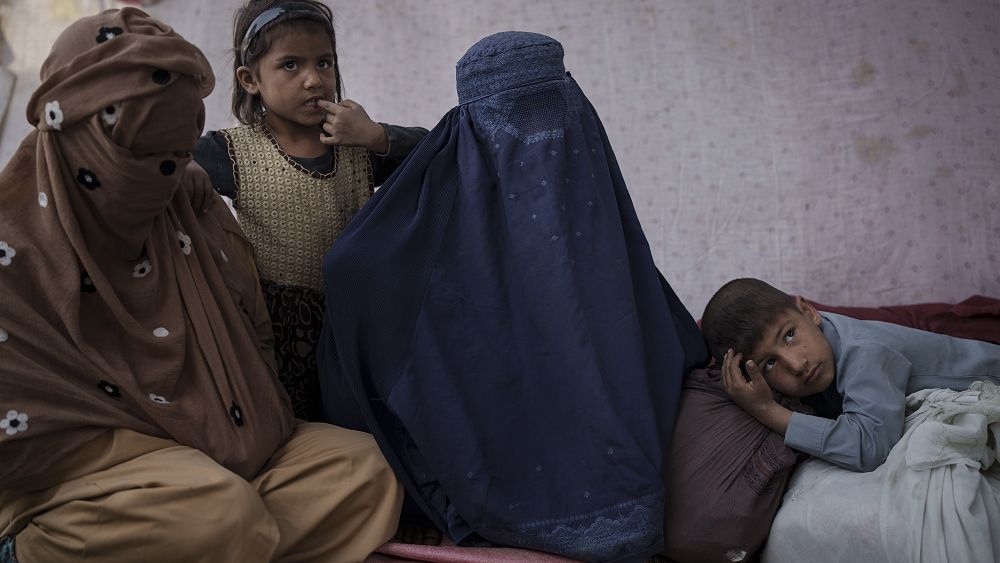
The European Union has announced a revamped humanitarian aid package worth €1 billion to deal with the aftermath of the Taliban takeover of Afghanistan.
The new package builds upon €300 million which had been already agreed to support the country’s civilian population, protect human rights and advance the coronavirus vaccination campaign. The European Commission will now add an extra €250 million for similar purposes.
These €550 million in aid will be channelled through international organisations working inside Afghanistan. The remaining €450 million have not yet been earmarked for concrete objectives.
Brussels has said it is ready to mobilise cash for neighbouring countries, like Iran and Pakistan, to help them host displaced Afghans and counter a new rise in terrorist activity and organised crime in the region. This support plan is yet to be designed and will depend on the evolution of the situation.
So far, no major movements of people leaving Afghanistan have been detected, but the European Union doesn’t want to risk being caught by surprise. Shortly after the fall of Kabul, national ministers from the 27 member states agreed to boost financial support for neighbouring countries to avoid a repeat of the 2015 migration crisis, when more than one million asylum seekers, many of them coming from Afghanistan, suddenly arrived at the EU’s external borders.
Back then, the bloc reacted hastily and chaotically, a scenario that both the EU institutions and the capitals are keen on averting. The current line of action is focused on injecting direct support to NGOs inside Afghanistan, as well as to neighbouring countries, in order to prevent a humanitarian crisis and a total collapse of the country’s economy, which could potentially lead to a massive exodus of Afghans heading towards the continent.
In the meantime, a multi-year package of €1 billion in EU development aid remains frozen, the Commission confirmed. Unlike humanitarian aid, development assistance requires closer cooperation with the government and public authorities, currently dominated by the Taliban.
Unlocking this programme is contingent on five requirements established by EU foreign affairs ministers in mid-September. The criteria involve respect for the rule of law and human rights, including women’s rights, and assurances that humanitarian aid operations are able to continue.
“We have been clear about our conditions for any engagement with the Afghan authorities, including on the respect of human rights. So far, the reports speak for themselves,” Ursula von der Leyen, President of the European Commission, said in a statement.
“But the Afghan people should not pay the price of the Taliban’s actions. This is why the Afghan support package is for the Afghan people and the country´s neighbours who have been the first in providing them with help.”
The new aid package comes just mere days after the Commission hosted a high-level forum to discuss the question of resettlement with member states and other international allies. Brussels says the EU has a “moral duty” to give protection to Afghanistan’s most vulnerable groups, such as women, girls, human rights defenders, journalists, judges and civil society activists.
However, since the 2015 migration crisis, resettlement has become a politically sensitive and highly divisive matter. Filippo Grandi, the United Nations High Commissioner for Refugees (UNHCR), has already asked the bloc to host 42,500 of the 85,000 vulnerable Afghans over the next five years.
Ylva Johansson, EU Commissioner for home affairs, said the request was “doable” but member states have so far failed to agree on a collective pledge. By contrast, the United Kingdom, the United States and Canada have already made specific commitments on how many Afghans they are willing to resettle.
“We will have time to find the right number,” Johansson said.
THE ROTTEN FISH: CAN OF WORMS OPENED OF APC & TINUBU'S GOVERNMENT OVER NIGERIA'S ECONOMIC DOWNTURN
WATCH THE CRITICAL ANALYSIS AND KNOW THE RESPONSIBLE PARTIES TO BLAME FOR NIGERIA'S ECONOMIC CHALLENGES, WHILE CITIZENS ENDURE SEVERE HARDSHIPS.Watch this episode of ISSUES IN THE NEWS on 9News Nigeria featuring Peter Obi's Special Adviser, Dr Katch Ononuju, 9News Nigeria Publisher, Obinna Ejianya and Tinubu Support Group Leader, McHezekiah Eherechi
The economic crisis and hardship in Nigeria are parts of the discussion.
Watch, leave your comments, and share to create more awareness on this issue.
#9NewsNigeria #Nigeria #issuesInTheNews #politics #tinubu THE ROTTEN FISH: CAN OF WORMS OPENED ...
DON'T FORGET TO SUBSCRIBE AND LEAVE YOUR COMMENTS FOR SUBSEQUENT UPDATES
#9newsnigeria #economia #economy #nigeria #government @9newsng
www.9newsng.com
